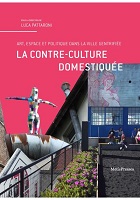La contre-culture domestiquée
Contributor(s)
Pattaroni, Luca (editor)
Collection
Swiss National Science Foundation (SNF)Language
FrenchAbstract
Longtemps moteurs de la contestation des modèles de développement urbain et foyer d’expérimentations artistiques, les milieux de la culture alternative sont aujourd’hui amplement intégrés aux formes contemporaines de production de la ville. Examiner la genèse et les enjeux contemporains de ce renversement permet de comprendre les ambiguïtés propres aux villes européennes qui voient les derniers espaces de liberté et de créativité disparaître à mesure que progresse la gentrification. Pour étudier cette institutionnalisation des contre-cultures, l’ouvrage s’appuie sur une série d’études de terrain à Genève, Lisbonne et Ljubljana qui met en lumière un nouveau régime de «post contre-culture», dans lequel questions urbaines et culturelles sont désormais indissociables. La contre-culture domestiquée propose ainsi un regard inédit sur les métamorphoses spatiales et politiques des villes européennes et interroge en particulier l’aporie de la «ville créative» qui proclame la réconciliation entre la culture et l’économie, alors même qu’elle exclut physiquement les franges les plus marginales et radicales des mondes de l’art et de la société civile.
Keywords
contre-culture; ville; politique culturelle; institutionnalisation; Genève; Lisbonne; Lubjana; art; capitalismeDOI
10.37866/0563-57-9ISBN
9782940563579, 9782940563579Publisher
Métis PressesPublication date and place
Genève, 2020Classification
City and town planning: architectural aspects


 Download
Download Web Shop
Web Shop